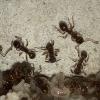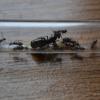Depends where you are from I suppose. Up in the great white north I've noticed some ants might lay eggs if kept room temperature during the winter, but a lot of the time they will not until they are subjected to at least 1-2 months of Hibernation. I'd say give it a week, if nothing is laying for you it might be just better off hibernating them and waking them up in a few months time. Hibernation for a lot of species of ants, esp. Northern ones is something you can't really skimp on. Even if you don't hibernate them they will often just go into a state of diapause anyway.
Generally speaking, if you get harsh winters outside you def. need to give your colonies some Hibernation. When I kept ants anything that flew after August needed to be hibernated for me. That may not be the case for a lot of people (especially considering that for my area September is usually nice at the start but we can get anything from an extra month of summer to literal winter temperatures in the negatives at night time incl. frost and snow.) I'd say go with what you see outside.
Edited by dermy, September 29 2019 - 9:06 AM.



















